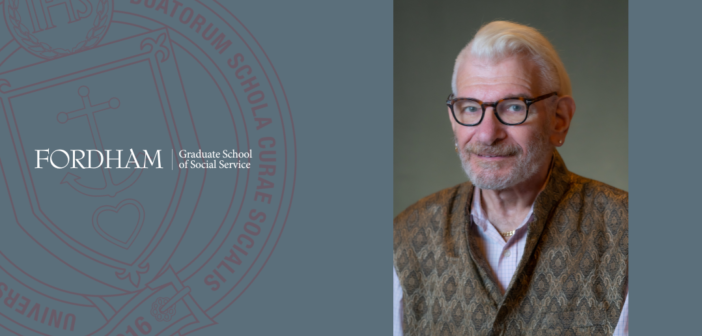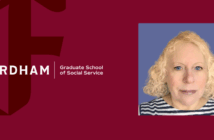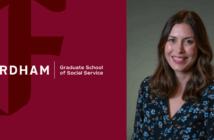Fordham GSS Clinical Professor David Koch, Ph.D., first stepped on a Fordham campus in 1980. He was a new professor, teaching “Human Sexuality,” a class he designed, at the Rose Hill campus in the Bronx. Koch said it was “unusual” at the time to have an openly gay man teaching at a Catholic university, but Fordham gave him unending support from the start.
“The Dean at the time was really committed to making a statement,” Koch said. “…I felt like this was really the place to hang my hat.”
Belonging. That’s what Fordham—and Koch’s colleagues—offered him, even when LGBTQ stigma surrounded them. That belonging continued to foster throughout Koch’s career in many ways, whether that be developing classes around HIV, or hiring more out-gay faculty members to share their perspectives and further enrich the school’s culture.
It’s why he chose to pursue his Master of Social Work (M.S.W.) studies at Fordham and further his teaching career on the faculty at GSS in 1998, where he has remained for 26 years. However, as of this June, Koch has announced that he will retire from teaching.
“Fordham…set me up to be able to do this work,” Koch said. “After 44 years, I think it’s time.”
We sat down with Koch to discuss teaching, the social work profession, and what’s next for him in his career journey.
A Commitment to Social Justice
Before getting his M.S.W. degree from Fordham, Koch had already earned a master’s in psychology. However, he knew the M.S.W. curriculum would teach him the skills and knowledge necessary to practice clinically with underserved individuals, groups, and families alongside his professorial duties. Fordham’s commitment to human rights and social justice enticed him to enter the program (not to mention that he was already a part of the school himself, as an undergraduate faculty member).
“My commitment to working with people affected by HIV was an incredibly powerful motivator for going into the field [of social work],” Koch said. “Fordham had a long history of commitment to social justice and working with communities in distress.”
Not long after joining the faculty at GSS, Koch received grant funding to create the Fordham-HASA (HIV/AIDS Service Administration) Training Academy. This one-of-its-kind partnership between Fordham University and New York City’s HIV/AIDS Service Administration allowed Koch and his team to train city employees with the knowledge and understanding necessary to properly serve those living with HIV in their communities. The impact was substantial.
“There was so much misinformation,” Koch said, “And people who worked for the city really didn’t know what to do.”
Koch ran the program for 16 years. He said the Fordham-HASA program, along with the GSS course Clinical Social Work Practice with LGBTQI Individuals, which he developed focusing on LGBTQ issues, was a testament to Fordham’s ongoing commitment to this population.
“It really made a statement to the world that Fordham wasn’t going to leave LGBTQ communities out in the cold,” Koch said.
Decades of Evolution
During his time in the field, Koch has seen an expansion of inclusion not only from Fordham but from social work as a whole. While social workers have always advocated for social justice, Koch said the field’s commitment to certain communities has taken on deeper meaning over the years. For example, Koch cited social work’s passion for transgender community rights as a milestone movement.
“I don’t think, in 2001, I could have anticipated that there would be such tremendous commitment to trans issues and transphobia,” Koch said. “Now, of course, it’s very timely since those rights are being challenged.”
Discussing topics like gender, sexuality, and race in class can be sensitive. Koch has made a career out of navigating these delicate issues and thus bringing forth the best in his students. But how does he strike a balance on such emotional content? Koch’s answer: authenticity.
“People look to the professor as a guide oftentimes, and if I was comfortable in my own skin as a gay man, then that allowed for people in the class at various levels to…feel more comfortable in their own skin,” he said. “…It’s a delicate arc, where you really are attempting to provide a space that allows for a person to feel more comfortable.”
This comfortability in the classroom reinforces the students’ capacity for professional resilience, Koch said. His research specialty focused particularly on this topic, and he described upcoming students as “aching for roles in the field” where they can make a difference, and have their professional resilience recognized. This is where the professor—a theorist and a practitioner—must meet the students’ desires.
“We as practitioners have to be ready to help people to handle issues that will strengthen their professional resilience,” he said.
Aside from his classroom duties, Koch has done this by forming an internship program within the William Alanson White Institute—one of the world’s most prominent and respected psychoanalytic training and treatment centers for over eighty years.
The Institute offers various educational opportunities, from immersive psychoanalytic training to continuing professional education for licensed mental health professionals. It even takes on M.S.W. interns to help meet the students’ field education requirements.
“We [the Institute]started with students from Fordham coming to do their field education, and you see…the student comes in feeling oftentimes at sea, not knowing what to do,” Koch said. “Then, as they are in sessions with clients, you become more adept at identifying what’s getting in the way of real growth. And part of that is really having to do with professional competence, and the practitioner, feeling more competent in what they’re doing as clinicians.”
A sense of incompetence in one’s role can be common among those entering a new career. Koch said the feeling is normal; in fact, it is inevitable. His advice? Don’t let it consume you.
“We’re going to feel moments of incompetence,” Koch said. “It doesn’t have to take over and make you feel like you shouldn’t be in this in this work.”
Onward to the Future
Koch is dedicated to social work and the well-being of his community. Just because this marks the end of his professorial role at Fordham, doesn’t mean he’s stepping out on the profession as a whole.
Besides his position at the William Alanson White Institute, Koch will continue to maintain his private clinical practice, seeing clients regularly. He believes in the power of this profession to change lives, and he doesn’t see himself giving that up any time soon.
“The work we’re doing is so important, in terms of our impact on people’s lives,” Koch said. “This field can help people to feel whole, real, and authentic.”



